When it comes to managing kidney health, the quality of water you consume plays a crucial role. You might be wondering which water purifiers can effectively remove contaminants while keeping essential minerals intact. Consider options like the Bluevua Countertop Reverse Osmosis System and the Waterdrop Alkaline Water Filter Dispenser, among others. Each product offers unique benefits tailored to your needs. But how do you determine the right choice for your situation? Let's explore the top picks and uncover what makes them essential for peak health.
Bluevua Countertop Reverse Osmosis Water Filter System (RO100ROPOT-Lite)
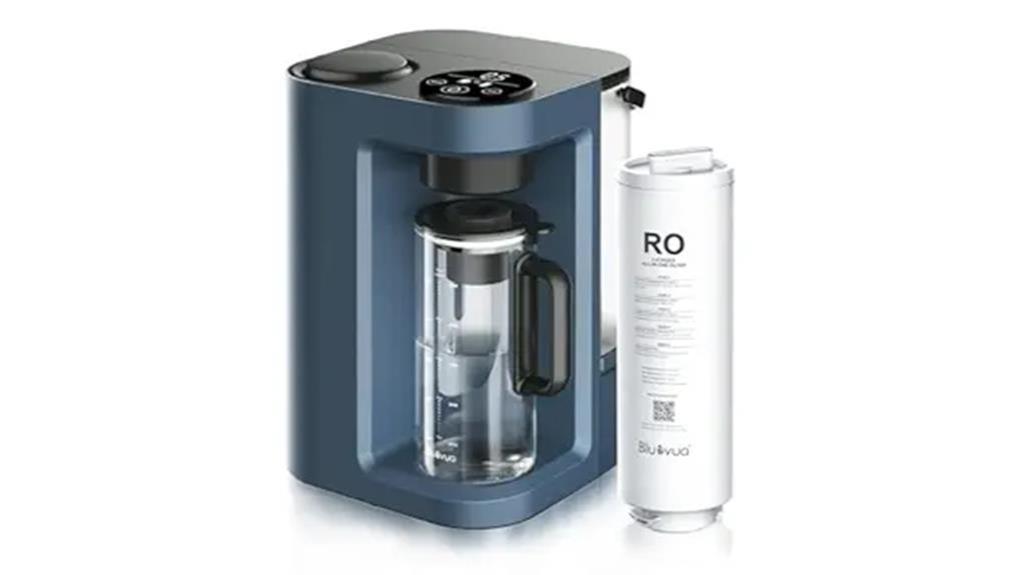
If you're a kidney patient looking for a reliable water purification solution, the Bluevua Countertop Reverse Osmosis Water Filter System (RO100ROPOT-Lite) is a standout choice. This system uses a 7-stage purification process, including UV light, to guarantee high-quality water. I love that it has a compact design, perfect for small spaces, and it requires no plumbing—making it ideal for renters like me. The efficiency is impressive, with a 3:1 filtered water to waste ratio and a filtration rate that greatly reduces TDS levels. Plus, the one-touch LED control panel makes monitoring easy. I find the taste and clarity of the water remarkably better than traditional pitcher systems, enhancing my hydration experience, essential for my health.
Best For: Individuals seeking a compact and efficient water purification solution, especially renters and those with limited space.
Pros:
- Highly efficient filtration with a 3:1 filtered water to waste ratio, significantly reducing TDS levels.
- User-friendly one-touch LED control panel for easy monitoring and filter alerts.
- Portable design requires no plumbing, making it convenient for relocation and suitable for small spaces.
Cons:
- Minor noise during operation, which may be noticeable in quiet environments.
- Annual filter replacement needed, which can add to ongoing maintenance costs.
- Limited capacity, ideal for 1-2 people but may not suffice for larger households.
Bluevua RO100ROPOT Reverse Osmosis System Water Filter
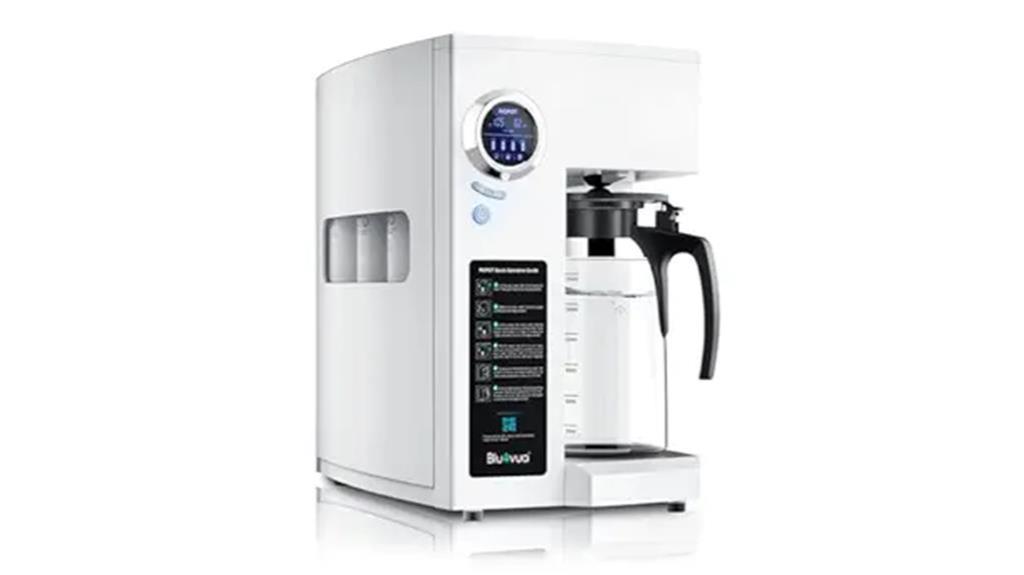
The Bluevua RO100ROPOT Reverse Osmosis System Water Filter stands out as a top choice for kidney patients due to its 5-stage purification process, which effectively removes 99.9% of contaminants, including harmful substances like fluoride and pesticides. I love that it has a remineralization filter, enhancing the taste and health benefits of my water. Its plug-and-fill design makes it user-friendly with no plumbing required, and it operates in a compact form, perfect for my countertop. The system's automatic power-saving mode and digital indicators help me keep track of filter life. Though the filling process can be tedious, the smooth, fresh taste of the water makes it worth the effort, ensuring I stay hydrated with quality water.
Best For: The Bluevua RO100ROPOT Reverse Osmosis System is best for individuals seeking high-quality drinking water, particularly those concerned with contaminants and health benefits.
Pros:
- Effective contaminant removal, including fluoride and pesticides.
- Excellent taste enhancement through remineralization.
- User-friendly design with no plumbing required.
Cons:
- Tedious filling and refilling process.
- Higher waste water production than anticipated.
- Takes up significant counter space.
P&G Portable Water Purifier Packets (12 Packets)
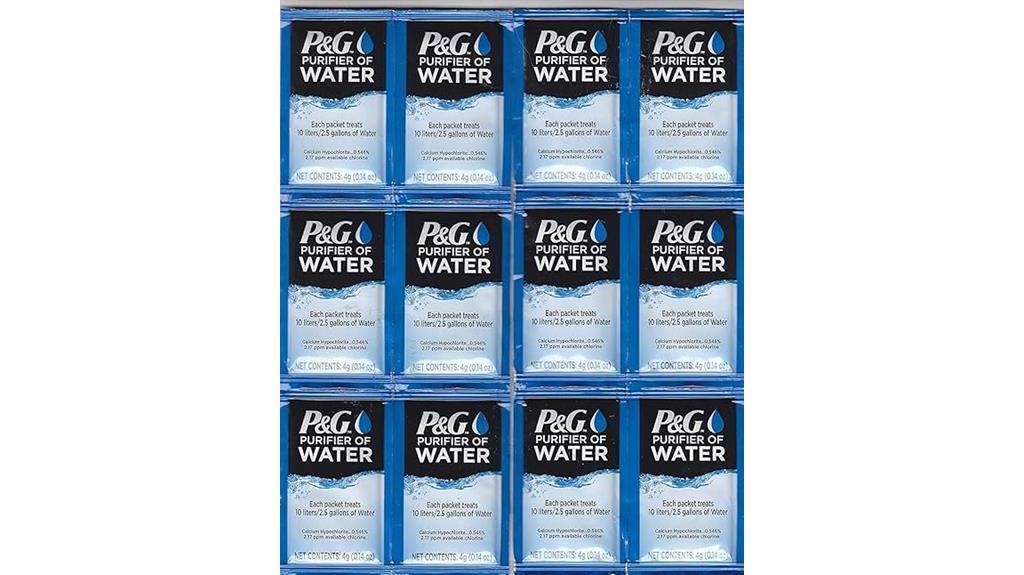
For kidney patients seeking a reliable and efficient way to guarantee safe drinking water, P&G Portable Water Purifier Packets stand out as an excellent choice. These lightweight packets effectively remove 99.9999% of bacteria and 99.99% of viruses, ensuring that even contaminated water becomes safe to drink. Each packet treats 2.5 gallons of water and works in just 30 minutes, transforming cloudy river water into clear, drinkable water. I appreciate their portability, making them perfect for emergencies or outdoor activities. With a shelf life until January 2026, they offer peace of mind during potential water interruptions. User reviews often praise the quality of the purified water, reinforcing my recommendation for inclusion in any kidney patient's preparedness kit.
Best For: Individuals, especially kidney patients, looking for a reliable and effective solution for safe drinking water in emergency situations or outdoor activities.
Pros:
- Effective purification: Removes 99.9999% of bacteria and 99.99% of viruses.
- Quick and easy to use: Purifies water in just 30 minutes.
- Portable: Lightweight and easy to carry, perfect for emergencies or outdoor adventures.
Cons:
- Higher cost: More expensive compared to some chlorine-based purifiers.
- Expiration date concerns: Users need to check manufacturing dates to ensure freshness.
- Limited treatment capacity: Each packet only treats 2.5 gallons of water, which may not be sufficient for larger groups.
Waterdrop 200-Gallon Long-Life Water Filter Pitcher
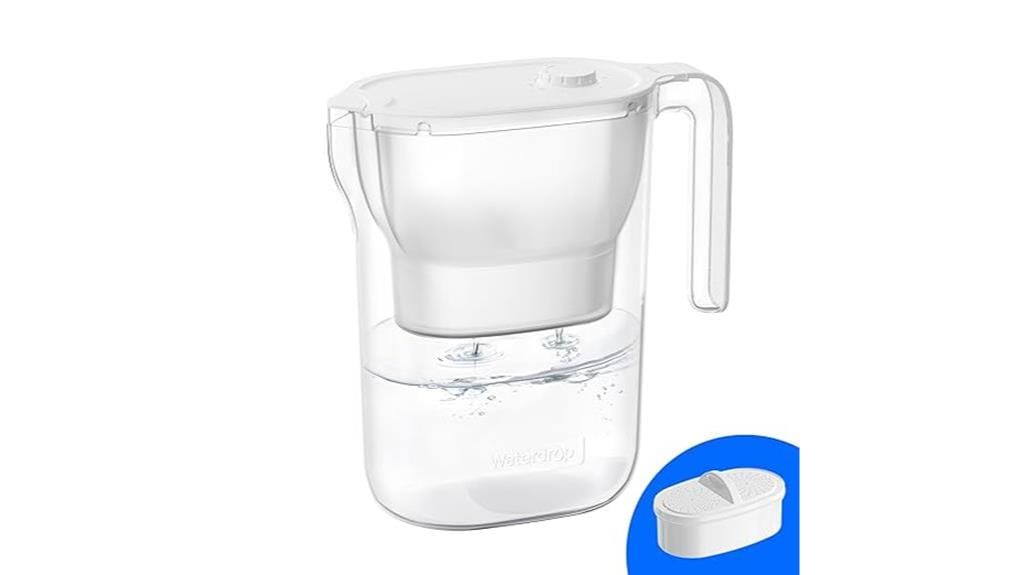
Designed with the needs of kidney patients in mind, the Waterdrop 200-Gallon Long-Life Water Filter Pitcher offers an impressive 7-cup capacity and is crafted from food-grade BPA-free plastic. This NSF-certified pitcher effectively reduces chlorine, PFOA, and other contaminants while maintaining beneficial minerals, ensuring smooth, odorless water. Its mechanical life recorder helps me track the filter's lifespan, which lasts up to three months or 200 gallons. I appreciate its compact design, allowing it to fit easily in my fridge, and the ergonomic handle that makes pouring a breeze. Despite some concerns about filter replacement costs, I find it an affordable choice for anyone looking to improve their water quality, especially if you're seeking a reliable option for kidney health.
Best For: Individuals seeking a reliable water filtration solution that improves taste while being safe and effective for kidney health.
Pros:
- NSF Certified, ensuring safety and effectiveness in reducing contaminants.
- Compact and ergonomic design allows easy handling and storage in refrigerators.
- Long filter lifespan provides significant savings by reducing plastic waste.
Cons:
- Some users report minor issues with lid mechanisms affecting usability.
- Replacement filters may be considered expensive by some customers.
- Not suitable for those looking to reduce TDS values in their water.
Waterdrop Alkaline Water Filter Dispenser (40-Cup, BPA Free)
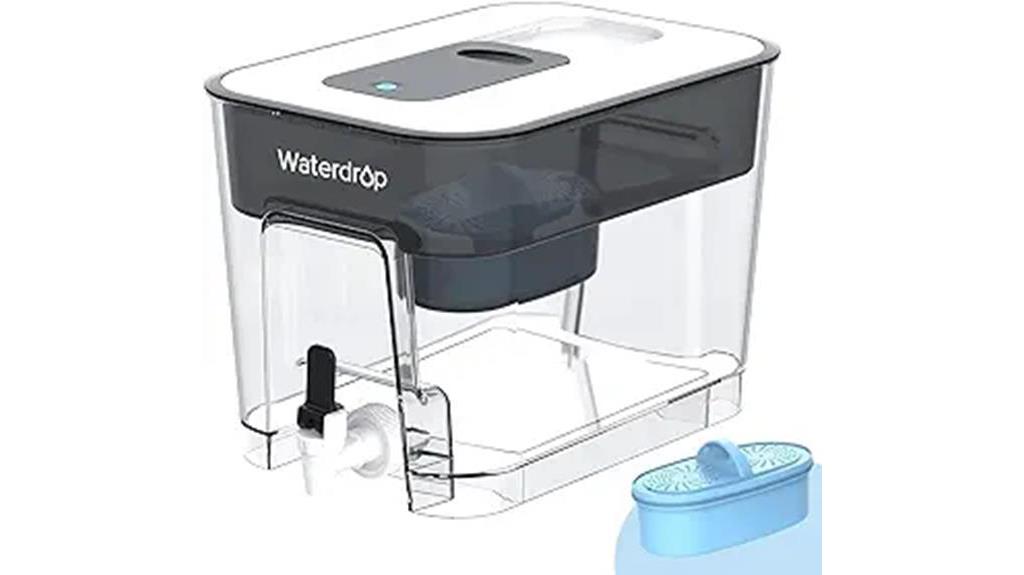
When seeking a reliable water purification solution, the Waterdrop Alkaline Water Filter Dispenser stands out with its impressive 40-cup capacity, making it ideal for families and kidney patients who need access to clean, mineralized alkaline water. This dispenser uses a 6-layer fine filtration system that effectively reduces harmful contaminants like chlorine and heavy metals without lowering the total dissolved solids (TDS). I love that it's made from BPA-free materials and fits neatly in my refrigerator. The smart filter replacement reminder is a fantastic feature, too. While some users have noted a slow filtration process, I find the taste of the water markedly improved compared to tap water. Overall, it's a great investment for anyone prioritizing health and hydration.
Best For: Families and individuals seeking a reliable source of clean, mineralized alkaline water for daily hydration and cooking.
Pros:
- Effective filtration: The 6-layer system reduces harmful contaminants while maintaining beneficial minerals.
- BPA-free materials: Ensures safe drinking water without harmful chemicals.
- Smart features: Includes a filter replacement reminder to help maintain optimal water quality.
Cons:
- Slow filtration rate: Some users report that the filtration process can be slower than expected.
- Replacement part availability: Difficulty in finding individual replacement parts, particularly for the spout.
- Customer service concerns: Mixed reviews regarding responsiveness and support for after-market needs.
Factors to Consider When Choosing Water Purifiers for Kidney Patients
When choosing a water purifier as a kidney patient, you need to take into account several key factors. Pay close attention to contaminant removal efficiency, as well as the importance of adding essential minerals back into your water. Additionally, think about the types of filtration technology, ease of use, and the maintenance requirements for long-term satisfaction.
Contaminant Removal Efficiency
Choosing the right water purifier is vital for kidney patients, as effective systems can remove up to 99% of harmful contaminants. You should look for purifiers that target specific substances that can impact kidney function, such as bacteria, viruses, fluoride, and heavy metals. A multi-stage filtration process, ideally incorporating advanced technologies like reverse osmosis and UV treatment, guarantees thorough purification.
Pay attention to the water-to-waste ratio as well. Systems with lower waste ratios, like 2:1 or better, are not only more efficient but also environmentally friendly. This efficiency is particularly important for kidney patients who need to manage their fluid intake carefully.
Regular maintenance and timely filter replacements are essential for maintaining peak performance. Some systems may require annual filter changes to keep contaminant removal efficiency high. By choosing a purifier that meets these criteria, you not only protect your health but also confirm that the water you drink is safe and beneficial for your kidneys. Prioritizing contaminant removal efficiency will help you make an informed decision that supports your overall well-being.
Mineral Addition Importance
Effective water purification doesn't just stop at removing contaminants; it also involves considering the mineral content of the water you drink. For kidney patients, mineral addition is imperative. Filtration processes, especially reverse osmosis, can strip away beneficial minerals, leading to potential deficiencies that impact your overall health and kidney function over time.
When choosing a water purifier, look for those with remineralization features. Restoring essential electrolytes like calcium and magnesium helps maintain a balanced intake of nutrients. A well-balanced mineral content in your drinking water is essential in preventing kidney stone formation by keeping your urine pH and calcium levels in check.
Moreover, mineralized water not only supports hydration but also enhances taste, encouraging you to drink more. Increased water intake is critical for kidney patients, as it aids in flushing out toxins from your system. By selecting a water purifier that guarantees mineral addition, you're not just prioritizing purification but also your health and well-being. Remember, the right balance of minerals in your water can greatly contribute to maintaining peak kidney health.
Filtration Technology Types
What should you consider when evaluating filtration technology types for water purifiers tailored to kidney patients? First off, reverse osmosis (RO) systems are a strong choice, as they can effectively remove up to 99.9% of contaminants, including harmful substances like fluoride and heavy metals. This is vital for kidney patients who need to limit their exposure to toxins.
You might also look into activated carbon filtration, which can enhance the taste and odor of water by reducing chlorine. However, keep in mind that it doesn't eliminate all contaminants, making it less suitable for those with kidney concerns.
Ultraviolet (UV) purification is another option worth considering. It's highly effective at eliminating 99.9999% of bacteria and viruses, adding an important safety layer for individuals with compromised kidney function.
Additionally, if you want to maintain a proper mineral balance, consider systems featuring remineralization, which adds essential minerals back into the water. Finally, pay attention to the wastewater ratio of the filtration system, as traditional RO methods can produce significant waste, which might be a concern for environmentally conscious users. Choose wisely for ideal health!
Ease of Use
When it comes to selecting a water purifier for kidney patients, ease of use is essential. You want a device that has a user-friendly design with simple controls, so you can operate it without difficulty, especially during emergencies or when you're feeling fatigued. A compact and portable design is also beneficial, particularly if you live in a smaller space or may need to relocate frequently—this makes placement and access much easier.
Additionally, look for a purifier with an efficient filtration process that achieves a high purification rate while minimizing water wastage. This is critical for kidney patients like you, who often need to monitor water intake closely. Clear indicators for filter life and water quality are important too; they help you keep track of when maintenance is needed, ensuring you always have access to clean water.
Lastly, opt for systems that require minimal assembly or plumbing. This reduces complexity during installation and makes it easier for you to manage your hydration without added stress. Choosing the right water purifier with these ease-of-use features can greatly enhance your daily routine.
Maintenance and Longevity
Maintaining your water purifier is vital for ensuring clean and safe drinking water, especially for kidney patients. Regular maintenance helps you avoid harmful contaminants that could worsen your health. Depending on the system, you might need to replace filters annually or even every few months. For instance, some reverse osmosis models cost about $0.22 daily for upkeep, so budgeting for this is important.
The longevity of filters varies greatly; some last 12 to 24 months, while others may require replacement every 3 months or after processing 200 gallons of water. Efficient filtration systems can remove up to 99.9% of contaminants, ensuring you get the finest water quality.
Pay attention to monitoring indicators or displays on your purifier. They help you track filter life and water quality, allowing timely replacements. This is essential for maintaining peak performance and ensuring your water stays safe. Additionally, consider waste water production; some systems waste more water than they filter, impacting your overall consumption and sustainability. Choosing a purifier that balances efficiency and waste can greatly improve your experience.
Space and Portability
Choosing the right water purifier for kidney patients involves considering space and portability, as these factors can greatly impact daily life. If you travel frequently or live in a small apartment, a portable water purifier becomes essential. Look for compact designs that conserve counter space, allowing you to fit your purifier in kitchens with limited room.
The ability to operate without plumbing or installation is another significant advantage. This feature enables you to set up and use your purifier easily, whether in your kitchen or while on the go. Pay attention to the weight and ease of transport, especially if you might need to carry it during travel or between locations.
A user-friendly interface and a straightforward filling process are also vital, particularly if you have mobility issues or need quick access to clean water. Opt for models that simplify these tasks, ensuring you're not struggling when you need hydration the most. By focusing on space and portability, you can choose a water purifier that seamlessly fits into your lifestyle while providing the best health benefits you need as a kidney patient.
Frequently Asked Questions
How Often Should Kidney Patients Replace Water Purifier Filters?
You should replace your water purifier filters regularly to guarantee clean, safe drinking water. Typically, it's recommended to change them every six months, but you should check the manufacturer's guidelines for specifics. If you notice a change in water taste or quality, it's a good idea to replace them sooner. Keeping up with filter replacements can help maintain the purifier's efficiency and protect your health effectively. Regular maintenance is key!
Can Water Purifiers Remove Heavy Metals Effectively?
Sure, you could just drink tap water and hope for the best, but that's like playing Russian roulette with heavy metals. Water purifiers can effectively remove heavy metals, depending on the type you choose. Reverse osmosis systems or activated carbon filters are your best bets. Just make sure to check the specifications; not all purifiers are created equal. You don't want to be sipping on a cocktail of lead and arsenic, right?
Are Countertop Purifiers Better Than Under-Sink Models for Kidney Health?
When choosing between countertop and under-sink purifiers, it really boils down to your preferences and needs. Countertop models are easier to install and move around, making them perfect if you're renting or want flexibility. Under-sink models, however, tend to have higher filtration capacities and can save counter space. Ultimately, you should consider factors like water quality, usage, and convenience to determine which type works best for your specific situation.
Do Water Purifiers Remove Chlorine Taste and Odor?
When you sip water, you crave clarity—no chemical aftertaste, no unpleasant odor. Water purifiers effectively remove chlorine taste and odor, making your drinking experience invigorating. They utilize activated carbon filters that absorb chlorine and other impurities, ensuring you enjoy clean water. You'll notice the difference immediately, as your water transforms from harsh to crisp. So, if you're tired of that chlorine taste, investing in a quality purifier can elevate your hydration game.
Is Bottled Water a Safe Alternative for Kidney Patients?
Bottled water can be a safe alternative for kidney patients, but you should choose wisely. Check the label for contaminants and verify it meets safety standards. Some bottled waters may contain high sodium levels, which isn't ideal for kidney health. It's best to consult your healthcare provider to determine what suits your needs. Remember, staying hydrated is vital, so find a water source that supports your overall health effectively.
Wrapping Up
Choosing the right water purifier is crucial for kidney health, and it doesn't have to be overwhelming. Each of these options effectively removes contaminants while preserving essential minerals. You might worry about complexity, but systems like the Bluevua Countertop model are user-friendly, making it easy to guarantee clean water at home. Think of it as giving your kidneys a rejuvenating drink—one that's free from harmful impurities and rich in the good stuff they need to thrive.

Hi, I’m Charlie, and I cover all things laundry here at Appliance Mastery.
I’ve spent over eight years working on washing machines, dryers, and dishwashers. I also have a degree in mechanical engineering, which helps me understand how these appliances really work.
I try to make every guide clear and practical. If you’re stuck with a noisy dryer or a leaking washer, I’ll help you figure out what’s wrong and how to fix it.
